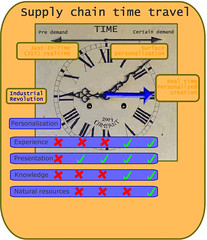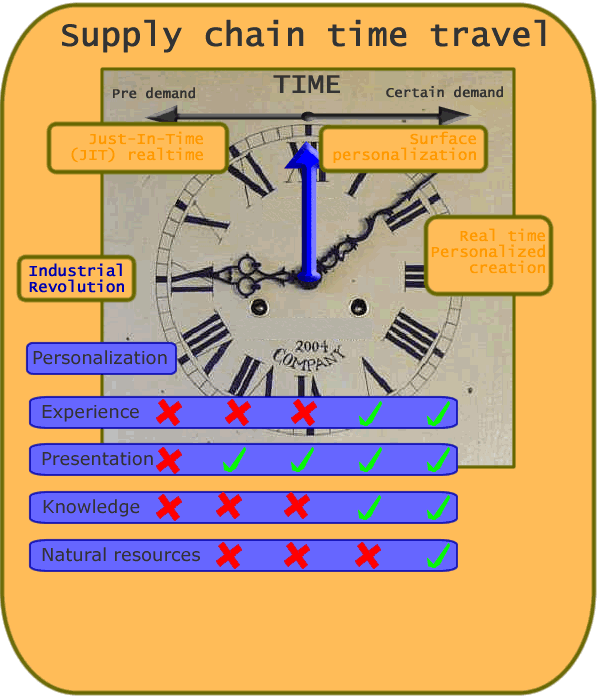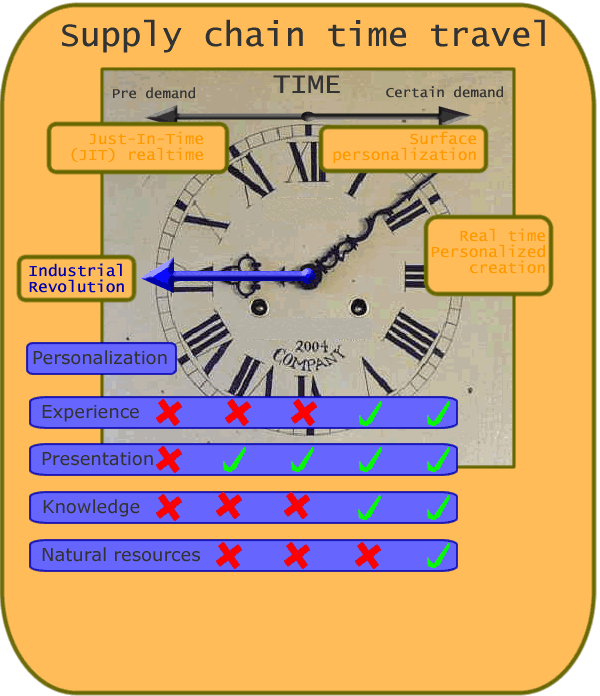Monday, July 30, 2007
Creation cycles (supply chains retired)
In the abundance economy, lead by the digitialists, supply chains have not end, (nor beginning) they are all cycles, cycles of information creating new information that turn into the stuff we need. And really need, want, desire, necessities etc. etc.
Creation cycles are the new demand and supply.
Tuesday, July 17, 2007
Organising demand & VRM
All the supply in the world is meaningless without demand. Demand is not well organised today. An individual, yes can have employess working for them, yes has access to technology, yes can have access to capital/money but all not on the scale of a business. Plus the main point is, from an individuals point of view, you would need to create a corporations capability for multiple industries, food, energy, transport etc. Why, life dictates the need for these services and products every day.
There is an industry that wants to solve this multiple service management issue, they call it VRM, Vendor Relationship Management.
Within the VRM framework there will be the need to provide not only this multiple vendor management interface (why would you want a different 'flavour of tool' for every service/product you need to manage?) but also tools that allow individuals to build/find/share information with other individuals i.e. social networks.
Social networks within VRM will look and feel like existing social networks but I don't foresee a world that you belong to a myspace or facebook or flickr sized for all the activities within VRM but you could if you needed to.
This organising of demand is just starting. We can look to the supply side to see what can be done. Demand will become as well organised as the supply side and I don't think it will take centuries to get there.
DIY Privacy
In the end of the day, individuals finance all business, so why do we not get a say in these important contract document of exchange?
Friday, June 29, 2007
capitial all becomes flow
I am not sure I share is 'efficient' claims. Two fold reseaons. Only a minority of the worlds capital is directly traded on the words financial markets. Secondly, any market which requires a stock of capital has huge efficiencies to be gained. Ideally, we want a market with nil capital stock.
We still need capital, just that the capital will be 100% flow. This is what the financial markets want to achieve in theory but I don't believe they have the information flows or property laws or incentive systems to come anywhere close to realising this. A world of 100% flow of capital requires no financial markets. No need for third parties to make capital allocation choices, usually on aggregate for others, no need to incur a needless transaction cost on moving the capital and no speculative flows.
It's not that these processes won't continue to exist. They will it is just that the individuals directly impacting the flow of capital will be participating. It will be too costly to outsource these activities.
To be thought about: the transistion to 100% flow of capital, how financial markets will evolve and then disappear.
Tuesday, June 26, 2007
life transactions
Capitalism forces are now ready to expand its ambitions for its currency. Money transactions summaries a much wider set of events. The cost of wrapping those in a monetary transaction are too high. In fact, I read that half the GDP of the world is accounted for by transaction costs. (I have no evidence to support this). There is a transaction framework that has more or less put those costs to zero. The framework, the Internet.
The cost of authoring or publishing information is near zero. For those transaction formed online then we have a new currency able to capture all events that are meaningful in the creation of a monetary transaction. This currency exist today and as time passes more and more of all monetary transaction processes are being authored to the Web. It is just a matter of time before society migrates to this new currency framework.
Society will be comfortable in it the way, we are with money and banking services today. However, life transaction will improve the incentive systems of capitalism. In monetary transaction the legal frame work governing the transaction is the mechanism to create trust. However, this does not lead to a transaction doing the right thing or allocationg resources best, most efficiently or even fairly. Life transaction authored online will have incentives to rewards transactors that deliver the outcomes sought be each party. Life transaction will be complete when what needs to be done is done. This does not need to be the case with a monetary transaction, this disconnect being money Achilles heel.
Capitalism will always need a currency, that name and purpose will change, as society evolves. Timing these evolutions is never easy but from what I see happening in the world, a new currency is in the making.
Friday, June 01, 2007
Creation chains (demand and supply retire)
It is clear that this is what the next stage of capitalism will demand. The Internet has given capitalism a new currency to expand its reach with, information. This bottoms up approach to capitalism focuses on creating an economy that focuses on sustaining life. The mechanism it will choose to 'allocate' resources will be creation chains. JIT time applied to the future. Monetary capitalism biased itself towards supply chains, where JIT of that supply chain being the holy grail.
Economies of scale, was a friend of supply chains. In creation chains they will increase costs.
The division of labour led to specialisation, but due to primitive communications those conversation became, in effect talking to yourself. Collaboration will allow all to communicate with all required in creation chains.
Commodity market, created monetary markets, that created derivatives of both to try and model the real word is saw. The Internet sees all that happen when people author to the internet. Money has a competition, its the incumbent but sure to be replaces in time.
Thursday, April 05, 2007
The way the economy will be
I want to purchase a car powered by 'black light power'.
This car does not exist today so I will need to fund the entire project. Here is how I will do it.
1. I use the Internet to tell the story about the car I want to drive, I input all my personal information and express my design of the car as compete as best I can ( luckily for me get tools are provided online, almost nil time and its fun and easy). I am 100% certain I will buy the car in 24 months time and use a marketplace to guarantee the purchase price of $80,000.
Two, challenges, I can not build the car, $80,000 is not enough to create the new car.
I go to the Internet again. Here, I find a pool of knowledge workers capable of creating the car, the marketplace tells me that the knowledge worker cost to create the car is $12,000,000.
I can not afford that but luckily, the word has got out on the de-centralised social network and 200 other people have join my 'black light power' car. And 19 others have committed $80,000. The cash is 100% committed now, now we have $1,600,000 (80k * 20) committed to creating the car.
A new attention economy outlook hedge fund has been analysing the Internet marketplaces. It notes that 201 * $80k $16,080,000 of potential income for the market (they note only 10% of that income is guaranteed) but on the upside they reckon more than 200 people in the world will want to purchase a personalised 'black light powered' car.
So, they go to the marketplace and pledge, $10,400,000 to the group of knowledge workers. The projects contracts are signed and to the total of $12m (10.4m investment + customer guaranteed $1.6m)
I and my fellow customers, guaranteed buyers, plus those not guaranteed plus new people that keep hearing about the project provide continues feedback, the same goes for the knowledge workers. Technical and design milestones are hit and the car is delivered in 24 months.
Return on investment for Hedge Fund. I was thinking you will pay them? Customers, knowledge workers, further users of the 'knowledge'.
OK, they invested $10.4m Where and how do they get a return?
Lets assume it is from the knowledge workers as they receive the cash for customer sales, in the context of they will need paid from the investors cash pre the sale of the first car from those not committed to pay up front.
So, in effect the non-committed future customer buying cars provide the new cash flows. Lets assume some sales,
200 expressed interest, 20 pre paid up front ( so they should get a return in the same way as the investors, thus reducing the cost of their product, this a positive incentive to pre pay, this does not exist in today's economy.)
We have 190 customer that see the completed car and want to purchase @ $80,000 Total sales $15,200,000.
The return for the investor (there percentage of income) 87% of $15.2 = $13.2m Profit ($13.2-10.4) $2.8m 27% return over 24 months plus the upside.
Lets assume 2000 new orders come in return 87% of $150.2 = £130m Profit ($130-10.4) 120m 1152%
So, the maths seem to stack up. I would envision that compared to building a car today, in the future the development cost per car will become less as we get more and more personalization coming into the market. Thus smaller absolute number of customers pooling together will be required to stimulate demand for new products.
Tuesday, April 03, 2007
Life Capitalism - Future looking supply chains
Businesses and eventually all businesses will be able to deliver products in speeds reaching real time. However, this does not guarantee profits, probably quiet the opposite. The new incentive will be to eliminate or manage this risk. Future looking supply chains will be the tool. Ironically, the success of this economy will not be gained by the supply chain. It will be from its complementary partner in Monetary Capitalism, the Demand Chain. I never thought thinking of two chains was particularly useful and if we continue to think in those terms a lack of profits will flow your way. Demand, what is demand? An individuals, groups of individuals that want to do or consume some thing right now in the world or plan to do that in some point in the future, a second from now to days, weeks or even years ahead.
This demand sets up future looking supply chains, demand will be used as the currency to use Personalization In Time (PIT) tools that maximise those businesses servicing demand. The better you do this the higher the profits and the lower the risk of manufacturing, whether that be information, products, services or thoughts.

supplychaintimetravel3
Originally uploaded by ecotorch.
Approaching High Noon for Monetary Capitalism Supply chains JIT
In terms of supply chain management the economic model of the industrialisation era has brought us COMMODITY supply chains that are approaching real time. Real time in the sense that Just In Time techniques (JIT) have squeezed the natural realities of material good and service manufacture to their limit. Even if businesses reach this point this does not guarantee success or profits. It is probably more likely that a business reaching this point will be making losses, unless it has guessed what to make. As this is all happening really fast, so fast that years of profitable history and a balance sheet cash rich can be broken. This will become too risky for a business. They will seek a new model of stability. Future looking supply chains will be the path to pursue.

supplychaintimetravel2
Originally uploaded by ecotorch.
Wednesday, March 21, 2007
Wednesday, January 31, 2007
Supply chain time travel PART 1

In the next few postings I am going to discuss the topic I call, Supply Chain Time Travel. I'll talk through the evolutionary path I see from the Industrial Revolution to the present day ( approaching 12 on the clock metaphor) and then a look ahead to 3 O'Clock. Next posting, the Industrial Evolution.
Social networks beats Search (more)
I made the point last time that by using the term, 'social network' I was not referring exclusively to web2.0 websites, they are still at a primitive stage of evolution. I mean the personal interactions with individuals, whether be in person, land line or online call, email etc. It is that social network that find s the best information. People, people in the network are processing information that I do not have. People have great processing abilities and we can input impressive amounts of data from our senses, sight dominating information flow to the brain but all the other senses contribute. A machine + a bit of software code, is not on this level, well not yet. But even when they are it will be the priorities set by our social network interactions that biases the rules by which we want to receive information on. Our Senses give the social network the lead over key word search processing power.
Friday, January 26, 2007
Profit on the march
Society is quite happy for a monetary value to be placed on commercial activities, mainly with a material object is at stake, e.g. a car to a human in a recruitment business. The one area where an Intangible services is making high monetary profits is online with targeted ad's. In effect the companies serving up these links are selling our attention data. Conclusion, the current world is expanding the meaning of profit, the first little steps and as the volume of attention data expands then that in itself will be where this expand profit definition will take hold. What will be the new currency after money? Influence?, it will be an intangible but as measurable as cash is today but the big difference being the biggest profits will be had in services derived from intellectual capital, the thoughts in your head minus the thoughts is another persons head. Step by step this will become the norm.
Profits natural definition and meaning is to value life, not physical token of exchange we call money, cash, cheques, digital cash etc.
Tuesday, January 23, 2007
Volition Science An introduction
What Andrew Galambos does in the first few chapters (lessons, the book is based on his lectures) is give precise definitions of words. You may agree or disagree with those but given what they are it allows for a robust intellectual framework. That framework, can create a 'natural society'. I'll post on topics along the way to that conclusion.
But to conclude for now, I found it interesting reading the amazon.com book review comments, 5 stars all the way.
Sunday, January 21, 2007
Saturday, January 06, 2007
life capitalism
More on this to come.
Thursday, January 04, 2007
spinning too fast for money
Brings me back to my days at University and monetary economics lectures. I listened to Michael Goldhaber at BayChi on the Emerging Attention Economy in July 2006 and one of his slides showed how in an attention economy, the number of transaction that happen are exponentially greater in volume than those in the current monetary/market based economy. I have been thinking about that slide and that lead me to recall the above equation. If you want some back ground on it, read the wikipedia entry.
are The half I was thinking about was the M.V and in particular the V. The velocity at which the speed of money needs to move. M is the amount of money in circulation. Then for economic progress to be made, lets simply say, that requires the number to get larger and increase over time. The point, I want to focus on. In today's economy, the framework has become too successful, we have the ability to make all the stuff (material) we need, in many cases, we are creating excess amounts. This means the V variable in the equation takes most, if not all the responsibility to contribute to 'making progress'. What happens? V spins, faster and faster and given the phyical nature of the cash, even digital cash this is creating an artificial sped up pace for economic life. We still are reving up the V, it seems to be still responding but the externalities are evident for all to see, from personal health to environmental imbalance.
Is there a way out? Yes, let assume we replace M with A. We replace Money with Attention. Attention is much lighter than cash (even digital cash). It is happy to spin quick, it can even spin at levels unimaginable to M. Given attention is human focused, the higher the rate of attention speed the better the social and I would speculate the wider environmental harmony will be put in place.
The intellectual equations are the easy part. However, I see plenty of evidence society is creating the necessary moves to allow A, Attention to replace money.

